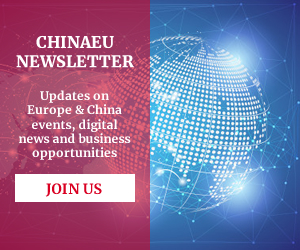G20 to discuss industrial digitalization G20开启工业数字化议程
Germany will chair this year’s G20 summit, which will be held in Hamburg on 7-8 July 2017. The ultimate goal of the annual G20 meetings of heads of state and government from the main economic powers of the world is, since the G20 was established in 2008, to find solutions to achieve strong, sustainable and balanced global economic growth. In this mission, governments are assisted by the business community, which will heold their B20 Summit on 2-3 May in Berlin. ChinaEU is eager to be part of this gathering.
作为G20主席国,德国将于2017年7月7日至8日在汉堡举行二十国集团首脑会议。自二十国集团2008年成立以来,G20峰会每年一届,汇聚世界主要经济强国的国家元首和政府首脑,旨在为实现强劲的、可持续发展的以及平衡的全球经济增长寻求解决方案。在这一个目标指引下中,各国政界人士与商业领袖将于5月2日至3日在柏林举行B20峰会。中欧数字协会也将积极参与到此次B20峰会中。
This year, the German Presidency decided to give digitalisation a special attention, following the steps of China in its G20 presidency last year. In Hangzhou, innovation, the new industrial revolution and the digital economy were discussed for the first time in a G20 Summit (click here for ChinaEU coverage on G20-B20 China Summit). As a continuation to China’s hard work, a new B20 taskforce on digitalization was created starting from this year. A digital affairs ministers conference will also be organised for the first time within the G20 framework.
继去年中国G20峰会对数字经济进行热议之后,德国决定将数字化作为今年会议的重点。在杭州,创新、新兴工业革命和数字经济首次作为G20峰会的论题在二十国集团首脑会议上进行了讨论(点击此处查看中欧数字协会在G20-B20中国峰会上的报道)。作为中国方面的努力的延续,新一届B20数字化专题小组于今年成立。第一次数字事务部长级会议也将在G20框架内举行。
As part of the preparatory activities, the Federal Ministry for Economic Affairs and Energy hosted the conference “Digitising Manufacturing in the G20 – Initiatives, Best Practices and Policy Approaches” in Berlin on 16-17 March in the run-up to the G20 Digital Ministers meeting, scheduled in Düsseldorf on 6-7 April. This two-day event offered a platform to discuss intensively the concepts and the approaches of several G20 states in the field of manufacturing digitalisation and to exchange views on the challenges faced by the individual G20 states.
作为筹备活动的一部分,德国经济与能源部于2017年3月16日至17日在首都柏林举办了“G20数字化制造—计划、最佳实践案例与政策方针”会议。这一会议也是即将于4月6日至7日在杜塞尔多夫举行的二十国数字事务部长级会议的前期会议。这一为期两天的活动集中讨论了数个G20国家在数字化制造领域的理念和方法,并就G20各个国家面临的挑战交换了意见。
 Wolfgang Scheremet, Director General Industrial Policy of the German Federal Ministry for Economic Affairs and Energy delivering a speech on the digitalisation of production in Berlin
Wolfgang Scheremet, Director General Industrial Policy of the German Federal Ministry for Economic Affairs and Energy delivering a speech on the digitalisation of production in Berlin
德国经济与能源部工业政策总干事Wolfgang Scheremet在柏林进行关于生产数字化的讲话
Wolfgang Scheremet, Director General for Industrial Policy of the German Federal Ministry for Economic Affairs and Energy pointed out in his opening speech that digitalisation is changing the world we live in and the way products are manufactured. In other words, we are in the midst of the 4th industrial revolution, led by digital transformation.
德国经济与能源部工业政策总干事Wolfgang Scheremet在开幕词中指出,数字化正在改变我们所处的世界和产品的制造方式。换句话说,我们正处于由数字化转型带动的第四次工业革命之中。
He said: “There are 13 billion connected devices worldwide today and the number will increase 20 times in the next 5 years. The amount of data produced because of digitalization is doubling every 2 years.”
他说:“今天全球共有130亿台联网设备,并且这一数量将于未来5年增长20倍。这意味着由于数字化而产生的数据量每两年将翻一番。”
“Digitalisation is not a one-time event, it is a dynamic process. It is important to coordinate our efforts from the very beginning and develop a joint common language for our machines”, stressed Scheremet.
“数字化并不是一蹴而就的事情,它是一个动态的过程。重要的是从一开始就协调好我们的努力,并为我们的机器开发共同的语言。” Scheremet强调说。
At the beginning of the year, the First Stakeholder Forum on Digitising European Industry, jointly organised by the European Commission and Member States, took place in Essen. The event gathered more than 500 delegates for a consultation on the action lines of the Digitising European Industry (DEI) initiative and fostered links between the various national and regional initiatives, digital innovation hubs and digital industrial platforms.
今年年初,由欧盟委员会及其成员国共同举办的第一届欧洲工业数字化利益相关方论坛在艾森举行。该论坛汇聚了500多名代表,就欧洲工业数字化(DEI)计划的行动路线进行了磋商,并推动了各国家和地区在计划、数字创新中心和数字工业平台方面的联系。
 Khalil Rouhana, Deputy Director-General, DG CONNECT, European Commission speaking at the Digitising European Industry Stakeholder Forum in Essen
Khalil Rouhana, Deputy Director-General, DG CONNECT, European Commission speaking at the Digitising European Industry Stakeholder Forum in Essen
欧盟委员会通信网络、内容及技术总司副司长Khalil Rouhana在艾森欧洲工业数字化利益相关方论坛上讲话
The gathering brought out a very positive and constructive message: Europe should stop complaining about the lack of a European version of Google or Baidu; instead we should focus on upgrading our competitive advantages and strengths, that is a strong industrial footprint, a strong talent base consisting of 4.7 million professional developers and a pool of highly sophisticated technologies developed by very promising European deep tech companies (companies focusing on artificial intelligence, robotics, virtual and augmented reality, and the Internet of Things).
会议带来了一个非常积极且具有建设性的信息:欧洲不应再抱怨欧洲版谷歌或百度的缺失; 相反,我们应该着重升级竞争优势和实力,即一个强劲的行业足迹,一个由470万专业开发人员组成的强大的人才队伍,以及由一批极具前景的欧洲深度科技公司(专注于人工智能 ,机器人,虚拟现实和增强现实以及物联网的公司)研发出的尖端科技。
Europe is aware of the importance and the urgency to utilize its core industrial advantage to remain ahead of its competitors worlwide. On one hand, it endeavors to promote industrial digitalisation across Member States. There are today thirteen initiatives brought forward at national level, such as “Industrie 4.0” in Germany, “Smart Industry” in the Netherlands, “Industrie du Futur” in France, “MADE Different” in Belgium, “Industria Conectada 4.0” in Spain, and “Piano Industria 4.0” in Italy. On 23 March 2017, the EU launched the European Platform of National Initiatives with an aim to coordinate the different national efforts by promoting best practice sharing and facilitating joint investments. The European Commission has set some very ambitious targets for this year: twenty National initiatives for digitisation of industry, and fifty more digital innovation hubs active across Europe by the end of 2017.
欧洲意识到利用核心工业优势来保有其在全球竞争中的领先地位的重要性和紧迫性。 一方面,欧盟努力促进其成员国的工业数字化,如今已出台了13个国家级的举措,例如,德国的“Industrie 4.0”,荷兰的“Smart Industry”,法国“Industrie du Futur”,比利时的“MADE Different”,西班牙的“Industria Conectada 4.0” ,意大利“Piano 4.0”。 2017年3月23日,欧盟启动了“国家计划的欧洲平台”项目,旨在通过最佳实践案例的分享和促进联合投资来协调不同国家的努力。 欧盟委员会还为今年设定了一个宏大的目标:二十个国家级工业数字化计划,以及于2017年底前在欧洲范围内建设五十个数字创新中心。
 Panel Discussion ‘Shaping the future industry together’ at the Digitising Manufacturing Conference in Berlin
Panel Discussion ‘Shaping the future industry together’ at the Digitising Manufacturing Conference in Berlin
在柏林举办的制造数字化会议的专题研讨会’共筑未来工业’
On the other hand, international collaboration and coordination remain crucial.
另一方面,国际合作与协调仍然至关重要。
As a leading power in the process of digitalization as well as the greatest contributor to global growth today, China is seen as a precious partner by the EU. The strategic importance of such partnership was epitomized by the choice of inviting An Xiaopeng, Deputy Director General of the Department of Information Technology, Application and Software services of the Ministry of Industry and Information Technology (MIIT) as the only foreign guest to deliver a speech at the opening session of the Berlin Conference to introduce China’s digitalization plans.
作为数字化进程的主导力量,也是当今全球经济增长最大的贡献者,中国被视为欧盟非常重要的合作伙伴。 这种伙伴关系的战略重要性即体现在邀请中国工业和信息化部(工信部)信息化和软件服务业司副司长安筱鹏作为唯一一位外国客人在柏林会议开幕式上致辞并介绍中国的数字化计划。
 An Xiaopeng, Deputy Director General of Department of Information Technology/ Application and Software service of MIIT delivering the opening speech at the Digitising Manufacturing Conference in Berlin
An Xiaopeng, Deputy Director General of Department of Information Technology/ Application and Software service of MIIT delivering the opening speech at the Digitising Manufacturing Conference in Berlin
中国工业和信息化部(信息技术部)信息化和软件服务业司副司长安筱鹏在柏林数字化制造会议开幕式上致辞
“In recent years, the Chinese government has attached great importance to the digitalization of manufacturing. China has always taken the integration of informatization and industrialization as a key strategy that we must uphold for the long-term national economic development. Since 2012, China has promulgated and implemented a series of strategies and plans, including Broadband China, Made in China 2025 and Internet Plus.” said An in his opening speech.
“近年来,中国政府高度重视制造业的数字化。中国一直把信息化和产业化的结合作为长期的国民经济发展应坚持的关键战略。自2012年起,中国颁布实施了一系列战略和计划,包括宽带中国,中国制造2025和互联网+。”安筱鹏在开幕致辞中说。
China boasts the largest ICT network in the world, with 280 million fixed broadband users, 68% of which have access to fiber-optic connections. The sector has been growing very rapidly, counting today 610 million 4G users, for total sales volume of 17 trillion RMB. ICT has become a key driver for the national economic development, contributing today to about 7% of GDP. By December 2016, there were 731 million netizens in China and the Internet penetration rate has reached 53%.
中国拥有世界上最大的信息和通讯技术网络,拥有2.8亿固定宽带用户,其中68%已接入光纤网络。该行业增长十分迅速,目前为止该行业已拥有6.1亿4G用户,总销售额达17万亿元。信息通信技术已成为国家经济发展的主要驱动力,约占国内生产总值的7%。截至2016年12月,中国网民达7.31亿人,互联网普及率已至53%。
With the wide penetration of the Internet in production and people’s life, a series of new types of business and business models came into being in the fields of e-commerce, online payment and the sharing economy. This has led to the creation of several Internet companies whose market value surpassed tens or hundreds of billion US dollars, such as Alibaba, Tencent and Baidu. In 2016, China’s e-commerce transactions valued 26 trillion yuan (3.5 trillion euro), ranking the top in the world.
随着互联网在生产和生活中的广泛普及,电子商务、在线支付和共享经济等领域形成了一系列新的业务和商业模式。数家市值超百亿甚至千亿美元的互联网公司也应运而生,如阿里巴巴、腾讯和百度。 2016年中国电子商务交易额达26万亿元人民币(3.5万亿欧元),居世界前列。
Digitising European Industry (DEI) has now become the industrial policy of the EU, aiming at boosting the digitization of industrial manufacturing sectors, from automotive, to healthcare, pharmaceutical and mechanical engineering, while driving the interconnection of products, value chains and business models, through the Internet. This is not much different from the “Made in China 2025”, China’s State Council’s initiative which was also directly inspired by Germany’s “Industry 4.0” plan. The goal of the political leadership in China is to comprehensively upgrade the Chinese industry towards a green, smart, efficient, sustainable and optimized structured that emphasizes quality over quantity.
欧洲工业数字化(DEI)计划现已成为欧盟的工业政策,旨在推动工业制造业的数字化,覆盖范围从汽车业到医疗、制药和机械工程,与此同时也带动了产品、价值链和商业模式的互联网联通。受德国“工业4.0”计划的启发,中国国务院提出了与欧洲工业数字化(DEI)计划十分相似的“2025年中国制造”计划。中国的目标是将中国产业全面升级为重质量而非数量的绿色、智能、高效、可持续发展的优化的结构。
In a global world, digitizing manufacturing requires close cooperation among technical bodies, companies and governments. Both the Chinese leadership and Europe are committed to foster an international joint-effort to explore synergies between national guidances and regulations and leverage each other’s strengths.
在全球化的今天,数字化制造需要技术机构、公司和政府之间的密切合作。中国领导人和欧洲国家都致力于促进国际合作,共同探索国家指导思想与方针政策之间的协同效应,发挥互利的优势。
ChinaEU identified priority areas of work on which Europe and China should focus:
- Improving the coordination of the respective legislations on digital, such as 5G, data flow, and cyber-security;
- Promoting efforts to provide skills training to ensure that the workforce is well prepared for a smooth adaptation toward new technologies;
- Exploring new business models and creating a favorable environment for SMEs, who are the major source of innovation and employment;
- Encouraging academic and scientific dialogue to boost joint research and comparative studies.
Work in this area would improve mutual trust and facilitate joint EU-China industrial digitization projects.
中欧数字协会提出了欧洲和中国应关注的重点工作领域:
- 增进有关数字法规的协调,例如在5G,数据流和网络安全方面;
- 加强技能培训,确保员工为顺利适应新技术做好充分准备;
- 探索新的商业模式,为作为创新和就业主要来源的中小企业创造有利的环境;
- 鼓励学术和科学交流,促进联合研究和比较研究。
在这些领域的工作必将增进欧中互信,并促进欧中工业数字化联合项目的发展。

